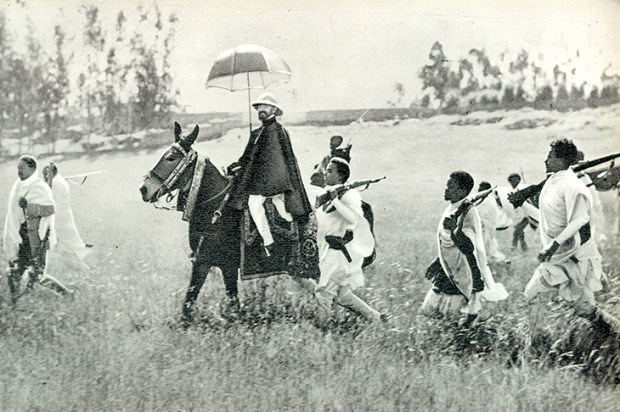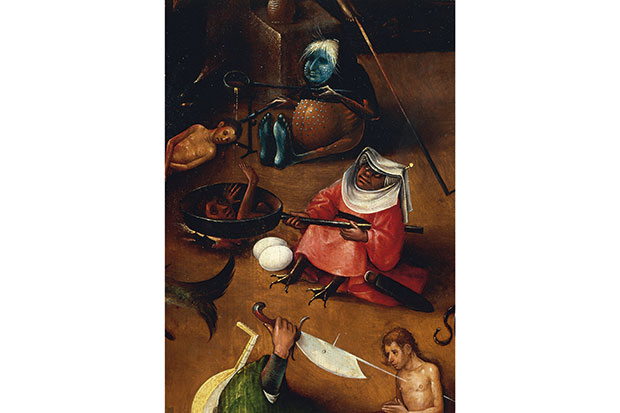Elvis only ever appeared in one commercial in his life — for Southern Maid, his favourite jam doughnut shop. That commercial appeared on the Louisiana Hayride radio show in 1955.
But since his death in 1977, Elvis has appeared in adverts all over the world: ‘Can’t Help Falling in Love’ has been borrowed to flog bathroom fragrances; a Greek dairy company used ‘Always on My Mind’; and Coca-Cola, BMW and Nike have all been promoted with ‘A Little Less Conversation’. Ted Harrison’s central thesis — that Elvis has been much more heavily and successfully commercialised in death than in life — is convincing.
This is an odd, rambling, repetitive book, too clumsily written, even for Elvis maniacs like myself, to be worth buying. But, for all that, it is original. And its most compelling line is that the reason Elvis has been so brilliantly marketed after his death is because he was so badly handled in his lifetime.
Had Elvis’s family inherited a fortune when he died, they might not have felt the need to market him so intensely. In fact, he left only one million dollars in the bank. The man who’d largely depleted his fortune was his manager, Colonel Tom Parker — the circus huckster who said after Presley’s death: ‘I owned 50 per cent of Elvis when he was alive, and I own 50 per cent of him now he’s dead.’
For two years after Elvis died, the Colonel remained in charge, with Presley’s naive father Vernon incapable of running the show. It was only on Vernon’s death in 1979 that Elvis’s former wife, Priscilla, realised what a mess the estate was in. To many Elvis fans, she is the villain of the piece — both for the enviable pleasure of marrying him, and then for the outrage of divorcing him. But, when it comes to salvaging Elvis’s finances — and her daughter’s inheritance — she is a hero.
In 1982, she opened Graceland to the public and eased the Colonel out of the operation the following year. In conjunction with Elvis Presley Enterprises, the Elvis corporate vehicle, she cracked down on tasteless merchandising, including the ‘Love Me Tender Dog Chunks’ and small vials of ‘Elvis Sweat’, with the marketing message, ‘Elvis poured out his soul to you, so let his perspiration be your inspiration.’ Elvis Presley Enterprises came to be referred to as ‘the Darth Vader of the merchandising-licensing business’, coming down hard on the souvenir sellers, and even on Elvis impersonators. The strategy was effective: take prominent legal action against the big players who were ripping off Elvis’s image, and the little players collapse in their wake.
During his life, Elvis’s story chimed and clashed with the echoes of America’s past: the white boy who absorbed black music; the southerner who conquered the north; the ultimate incarnation of the rags-to-riches American dream. In death, Elvis tells the story of modern America and the brute strength of capitalism, which can remorselessly hawk the rights to a ghost to the highest bidder. In 2005, Lisa Marie and Priscilla Presley sold 85 per cent of the Elvis brand to CKX Inc, a company owned by Robert F.X. Sillerman, then the 375th richest man in America. Since then, Elvis’s spirit was run by Core Media Group (the new name for CKX), which sold its Elvis interests in 2013 to Authentic Brands Group.
Now Authentic Brands owns the rights not just to Elvis but to the brands of Muhammad Ali, Michael Jackson, Marilyn Monroe — and Juicy Couture. The legends that dominated our hearts and souls from the 1950s are now bloodless corporate entities, sliced and diced and sold to the highest bidder.
But there is a silver lining to this commercialisation of beauty. Because Elvis’s corporate owners are keen to squeeze every last cent out of him, he is constantly reinvented for new generations. Last year, Elvis topped the UK singles chart three times, and the album chart for a 12th time — giving him more number ones than any other male solo artist. When the Disney cartoon Lilo & Stitch came out in 2002, the soundtrack included five Elvis songs. Hey presto! Another generation hooked on the King.
Harrison’s book lurches into some elongated comparisons between Elvis and Jesus, and the fruitcakes who combine worship of both. Among them is a Canadian Anglican vicar, Elvis Priestley, who presides at the Christ the King Graceland Independent Anglican Church of Canada. Another is the gloriously named Reverend Mort Farndu of the Presleyterian Church, who has devised Elvis-based commandments: ‘Don’t be Cruel’; ‘Don’t be a Hound Dog (Catch a Rabbit and be a Friend of His)’.
All very silly — but, still, all offshoots from a worldwide Elvis obsession that remains astonishingly robust. Elvis hasn’t left the building.
The post Long lives the King appeared first on The Spectator.
Got something to add? Join the discussion and comment below.
Get 10 issues for just $10
Subscribe to The Spectator Australia today for the next 10 magazine issues, plus full online access, for just $10.
You might disagree with half of it, but you’ll enjoy reading all of it. Try your first month for free, then just $2 a week for the remainder of your first year.














Comments
Don't miss out
Join the conversation with other Spectator Australia readers. Subscribe to leave a comment.
SUBSCRIBEAlready a subscriber? Log in